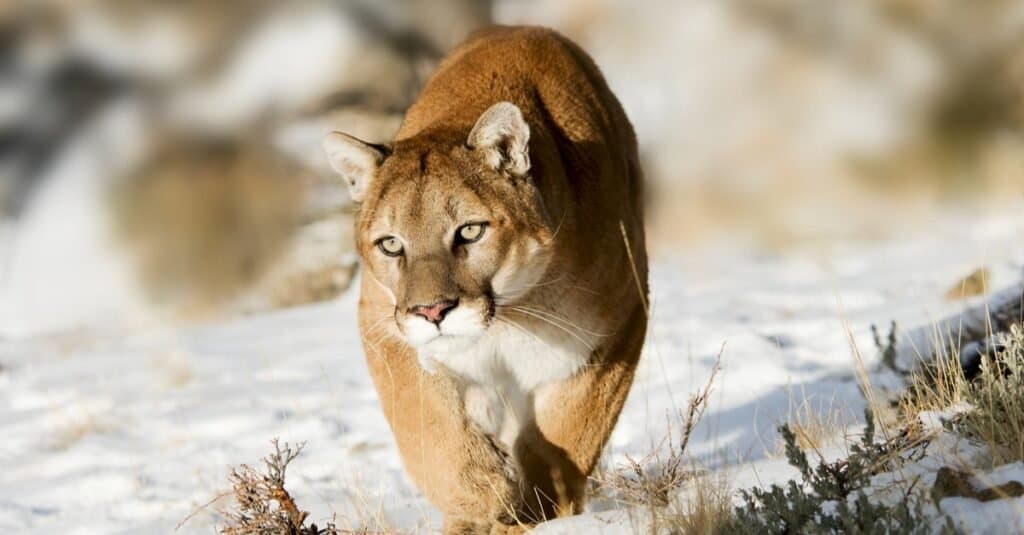
A mountain lion stalking its prey. These types of big cats aren’t always the apex predator in their range, and their kill is sometimes stolen.
©Scott E Read/Shutterstock.com
Mountain lions are one of the most dangerous wild cats in North and South America. However, unlike your housecat, mountain lions have a very unique way of communication: through what sounds like a blood-curdling scream. But why do mountain lions scream? You’ll learn that and more below.
Ready to learn more? Keep reading!
What Does A Mountain Lion Sound Like?
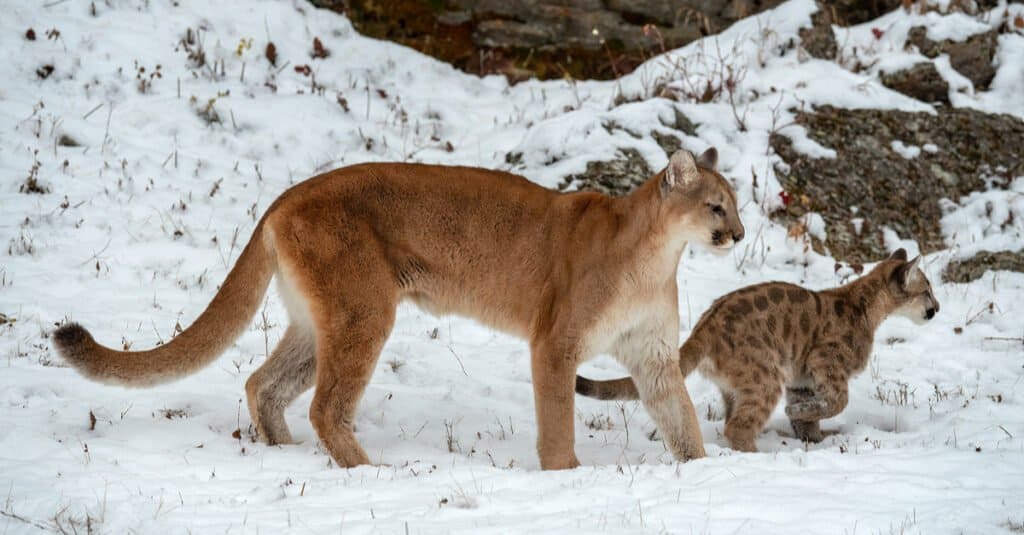
Mountain lion
cubs make different sounds than adults.
©Chris Desborough/Shutterstock.com
Imagine this: you’re out in the woods; it’s dark, and you hear a scream from somewhere deep in the forest. This nightmarish scenario is actually more common than you might think. However, there’s a high chance that this scream isn’t what you think it is.
While it may sound like a child or woman in distress, these screams can often be traced back to one apex predator: the mountain lion. That’s right. These wild cats, also known as cougars, pumas, and many other names, are known for their frightening screams. However, if you were to hear this you may wonder, why do mountains lions scream?
Why Do Mountain Lions Scream?
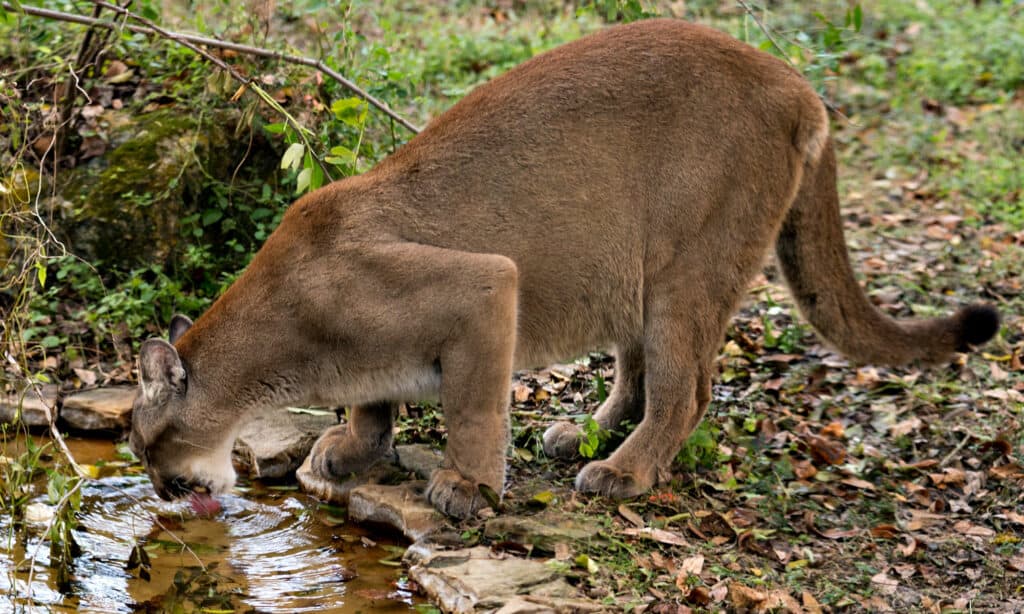
Mountain lions
can be found in many different habitats.
©iStock.com/Rejean Bedard
While it may seem like an intimidating sound, mountain lions aren’t actually screaming to try and scare you. Instead, screaming is a part of their mating rituals.
Because mountain lions rarely share territories and thus live so spread out, it can be difficult to tell when a female has gone into heat. This is the time in which she is able to have kittens. Screaming allows for mountain lions to attract male mates.
As a result, the answer to why do mountain lions scream is actually quite simple: it’s their way of dating!
Occasionally, you may hear a male scream, but it is much less common. When a male cougar screams, it usually has to do with keeping rivals away from territory and potential mates.
Mountain Lion Sounds and Meanings
Although the mountain lion’s scream may be its most iconic noise, it’s not the only sound you’ll hear them make. Here are some of the most common mountain lion sounds and their meanings.
Screams
Screams are actually one of the rarer sounds that a mountain lion will make. Because screams are used as mating calls, they only occur within the mating time.
However, unlike other animals, mountain lions don’t have a particular mating season. Instead, each individual female has her own heat cycle, similar to house cats. This means that you can hear a mountain lion scream at any time of the year but only if there is a female in heat nearby.
Growls and Hisses
If you hear a mountain lion growl or hiss, it usually only means one thing: danger.
Mountain lions are ambush predators. This means that they won’t go out of their way to hunt down a meal and prefer stalking from the bushes. However, if you’re unfortunate enough to stumble too close, especially to a family, you can expect to hear growls and hisses. These mountain lion sounds let you know that you’ve traveled into the wrong area at the wrong time and need to carefully leave to avoid an unpleasant encounter.
Chirps and Whistles
Mountain lions don’t stop at mimicking humans: they can also mimic birds. They’re not trying to, however. While chirps and whistles may seem like they belong in a beak, you can actually find them in mountain lion dens as well.
Young mountain lions, known as kittens or cubs, will call out to their mothers with chirps and whistles. Kittens will live with their mother for their first two years of life, but these mountain lion sounds are more common during their earlier months.
How to Identify Mountain Lion Sounds
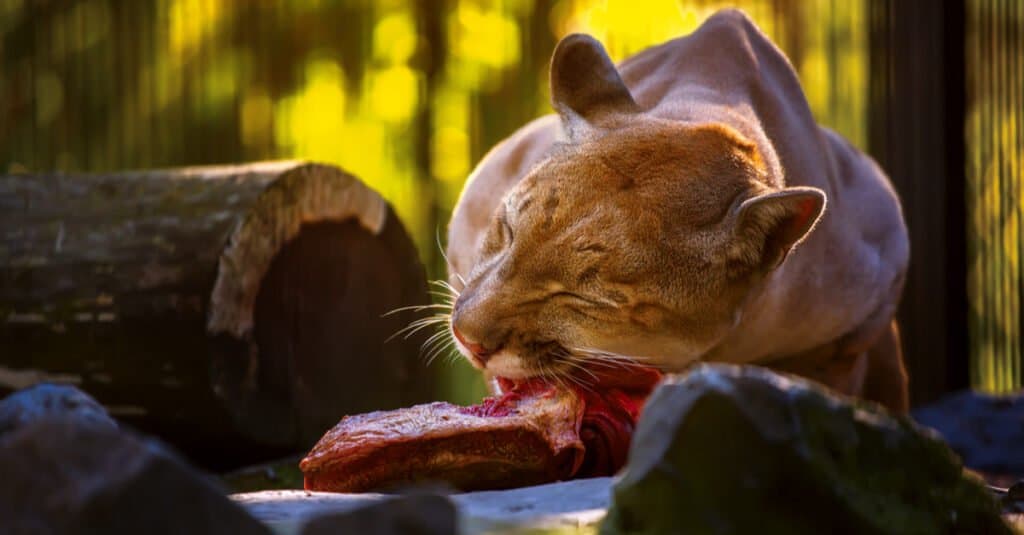
One sign a mountain lion is near is if you stumble across where they’ve stored a kill.
©Ipatov/Shutterstock.com
The best way to identify mountain lion sounds is to look for other key traits. Often, mountain lions make sounds that resemble those of other animals, so it can be difficult to tell only by hearing a sound whether or not it’s a mountain lion.
First, look for tracks. A mountain lion has three divots in its bottom pad, making it look almost like it is shaped like an “M”. They also rarely have claw marks visible in their tracks thanks to their retractable claws.
You can also look for droppings and claw marks on trees. You may also stumble across a kill that they have hidden.
What to Do if You Hear a Mountain Lion
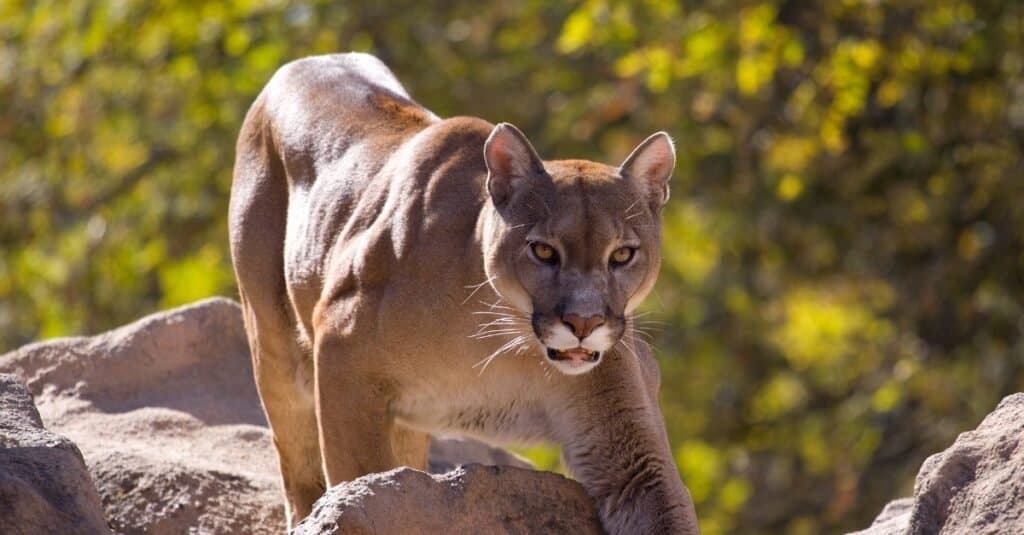
Cougars are large cats, and although not usually aggressive, have been involved in attacks on humans as well as causing death.
©iStock.com/SandmanXX
If you’ve heard what you think is a mountain lion and you found other signs, it’s time to be proactive to prevent a bad encounter.
Mountain lions are ambush predators, and so they’re not looking to put up a fight. As a result, try to never turn your back on them, and never crouch down. Instead, wave your arms and speak in a loud, firm voice.
Make sure to always pay close attention when you’re entering an area where mountain lions might be. Although encounters are rare, and attacks even rarer, it’s always better to be safe rather than sorry.
The photo featured at the top of this post is © Chris Alcock/Shutterstock.com
Thank you for reading! Have some feedback for us? Contact the AZ Animals editorial team.






